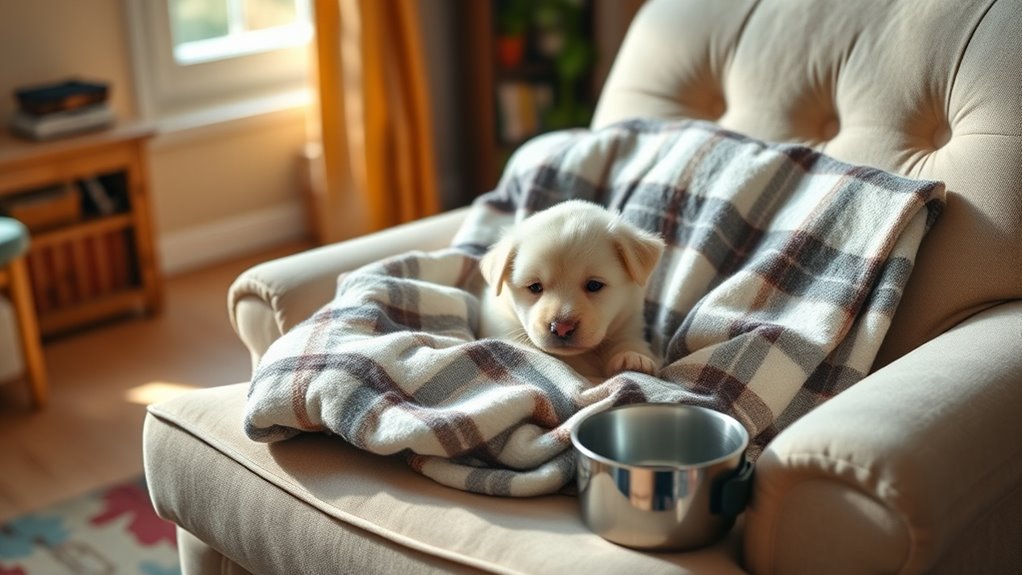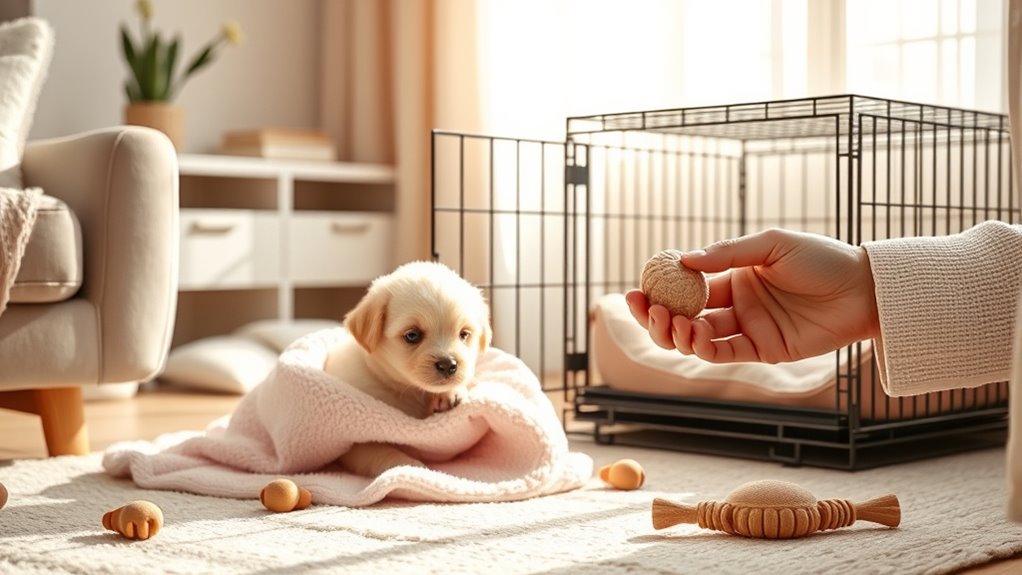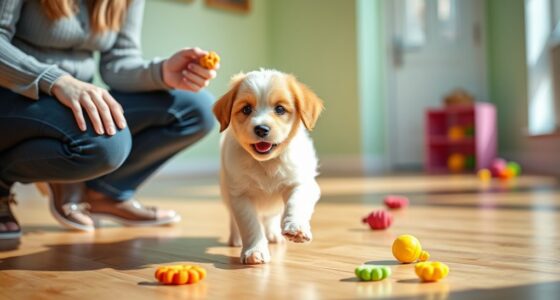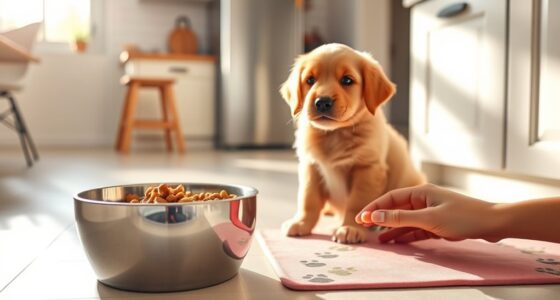In the first 48 hours, focus on creating a calm environment, establishing routines for potty breaks, meals, and rest, and introducing your puppy gently to new sights and sounds. Take your puppy outside every couple of hours and praise enthusiastically when they go. Be patient and use positive reinforcement to build trust. Consistency and gentle guidance now set the tone for a happy, well-behaved pup. Keep going to learn more about setting a strong foundation.
Key Takeaways
- Establish a consistent routine for feeding, potty breaks, and play to create predictability and security.
- Introduce the puppy gradually to new sights, sounds, and people with positive reinforcement.
- Take the puppy outside every 2 hours, after naps, and after meals for potty training.
- Create a cozy, designated space like a crate or bed to promote rest and reduce anxiety.
- Use gentle, positive guidance and avoid punishment to build trust and encourage good habits.

Bringing a puppy home is an exciting milestone, but the first 48 hours are crucial for setting the foundation of your new relationship. During this time, your puppy is adjusting to a completely new environment, and your actions will influence their behavior and trust for years to come. One of your primary goals should be establishing good habits early, especially when it comes to potty training. Puppies have small bladders and limited bladder control, so consistent, gentle guidance is key. Take your puppy outside frequently—every two hours, after naps, and after meals—to encourage them to go in the right spot. When they eliminate outdoors, praise them enthusiastically; this positive reinforcement helps them associate going outside with good things. Avoid punishing accidents inside; instead, clean the area thoroughly to eliminate odors that might attract them back there.
Socialization tips are equally critical during these initial days. Your puppy needs gentle exposure to new sights, sounds, and people to develop confidence and reduce future fears. Start with short, positive encounters—let your puppy meet calm, vaccinated family members and friends in a controlled environment. Introduce new but non-threatening objects or sounds, like a vacuum or doorbell, gradually and calmly, always rewarding their curiosity. Keep interactions positive; if your puppy seems overwhelmed, give them space and time to process. This early socialization helps prevent behavioral issues later and encourages your puppy to become well-adjusted and friendly.
In these first two days, establish a consistent routine. Puppies thrive on predictability, so feed them at regular times and keep a schedule for potty breaks and play. Create a designated, cozy space for your puppy to rest—like a crate or bed—where they can feel safe and secure. This space will become their retreat and a tool for potty training, as puppies naturally avoid soiling their sleeping area. Be patient and gentle, understanding that your puppy is learning about their new world. Spend quality time bonding, but also give them space to explore at their own pace. Use this period to lay the groundwork for good behavior and trust, which will make the subsequent days easier and more enjoyable for both of you. Remember, these first 48 hours are the start of a lifelong friendship, and your calm, consistent approach will set your puppy up for success.
Frequently Asked Questions
How Do I Introduce My Puppy to Other Pets Safely?
When introducing pets, you want to manage introductions carefully to guarantee safety. Start by keeping your puppy and existing pets in separate spaces, then gradually allow supervised visits. Use calm tone and positive reinforcement to encourage good behavior. Keep initial meetings brief, and watch their reactions closely. Over time, increase their time together, always managing introductions to prevent aggressive behaviors and foster a peaceful relationship between your puppy and other pets.
What Are Signs of Stress or Illness in a New Puppy?
Ever wondered how to spot if your puppy’s stressed or unwell? Watch for stress indicators like excessive whining, hiding, or loss of appetite. Changes in puppy health, such as lethargy, vomiting, or diarrhea, also signal a problem. Keeping a close eye helps you respond quickly. Are they showing these signs? If so, consult your vet promptly to guarantee your puppy’s well-being and comfort.
How Can I Prevent My Puppy From Developing Separation Anxiety?
To prevent your puppy from developing separation anxiety, focus on puppy socialization and crate acclimation. Gradually introduce your pup to different people, environments, and other animals to build confidence. Use the crate as a safe space, making it comfortable and associate it with positive experiences. Practice short departures, then increase your time away slowly, so your puppy learns that being alone is normal and safe.
When Should I Start Crate Training My Puppy?
Imagine the moment your puppy finds comfort and safety in a crate. You should start crate training as soon as possible, ideally within the first few days. This helps your pup develop a sense of security and aids in puppy socialization. Consistent, positive experiences build trust. Don’t wait—early crate training sets the foundation for a well-adjusted, confident dog, easing future training and strengthening your bond.
What Are Essential Supplies I Need Immediately After Bringing Puppy Home?
When you bring your puppy home, you need essential supplies like quality puppy food for proper nutrition, a comfortable crate, toys, and grooming tools. Focus on puppy nutrition to support growth and development. Also, gather socialization tips, such as gentle introductions to new people and environments, to help your puppy build confidence and good behavior early on. These essentials set a strong foundation for a happy, healthy pup.
Conclusion
Now that you’ve taken those vital first steps, your puppy’s future depends on what you do next. Will you establish trust and set boundaries, or risk confusing your new companion? The first 48 hours are just the beginning—every moment counts. Stay attentive, patient, and consistent. Because in the coming days, your puppy’s true personality will start to shine through. Are you ready to shape a lifelong bond? The journey has only just begun.










